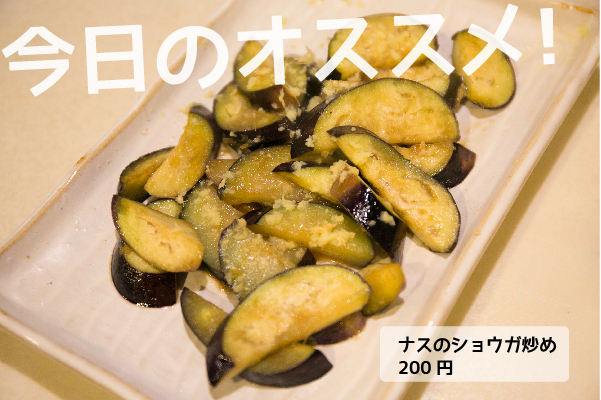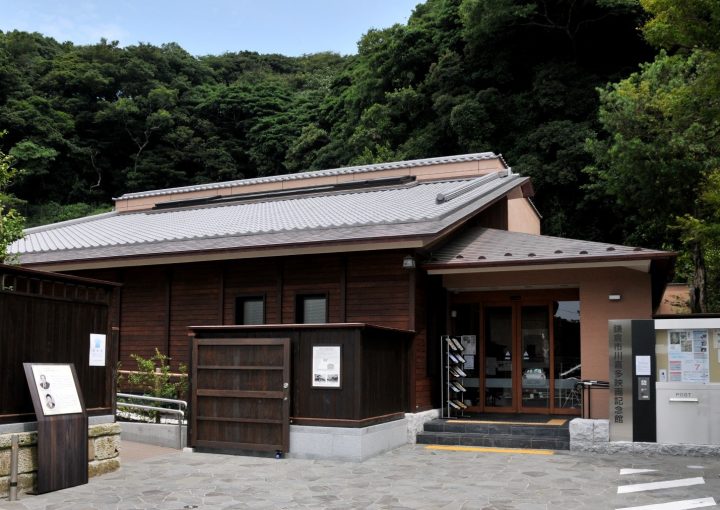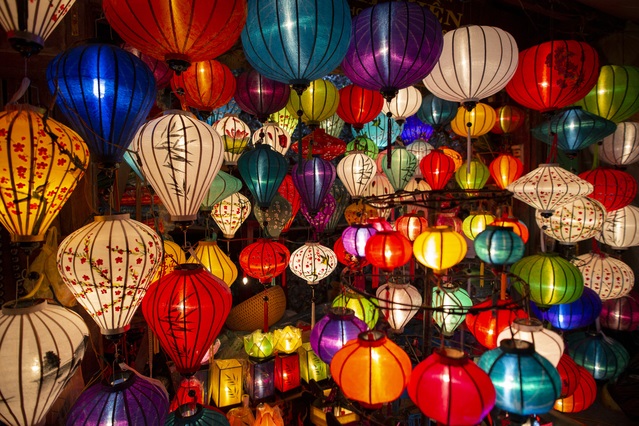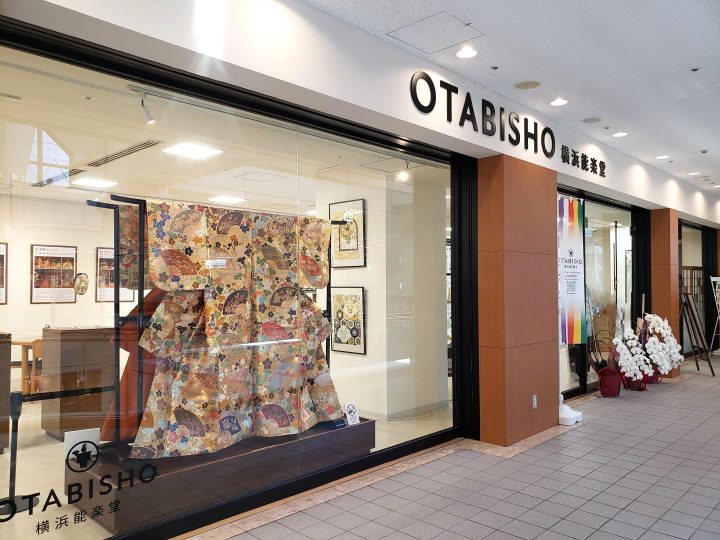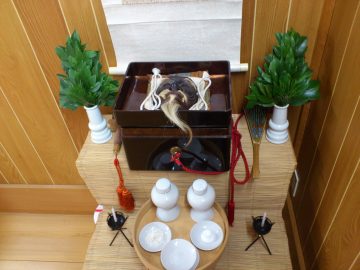Kanagawa・Standing Bar Culture Talk Vol.1 "Bad Places and Underground"
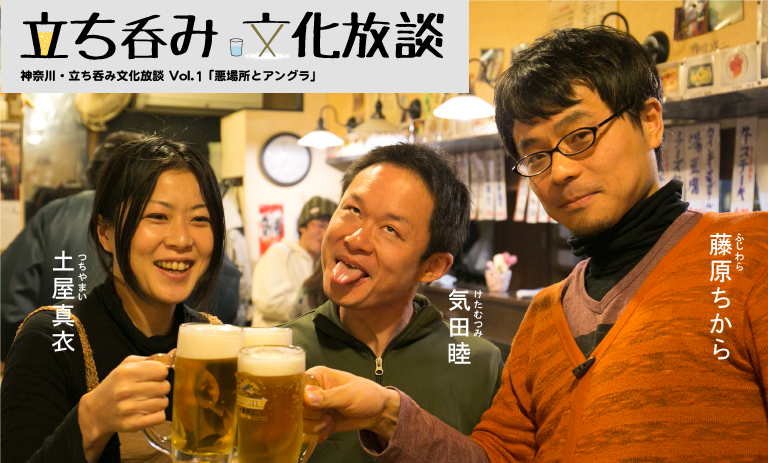
2014.4.1 Text: Akiko Inoue Photo: Masamasa Nishino
Chikara FUJIWARA
Editor, critic, and freelancer. Founder of BricolaQ. Born in Kochi City in 1977. Moved to Tokyo alone at the age of 12 and started living there. Moved around a lot after that, worked for a publishing company before going freelance. Edited magazines such as Ex-Po, Musashino Art University's newsletter mauleaf, and Setagaya Public Theater's CaroMag. Co-edited and co-authored with Tsujimoto Chikara "Book Guide as Architecture" (Meigetsudo Shoten). Co-authored with Tokunaga Kyoko "The Strongest Engeki Theory" (Asuka Shinsha). Currently lives in Yokohama. Involved in the launch of Theater Center F.
Mutsumi KETA
Born in Shizuoka City. Since joining the Karagumi Theatre Company in 2005, he has performed in all of Karagumi's productions to date. He has also appeared in Nozoe Seiji x β x Utervision "My Sunshine," Kyoka Meigetsukai's 2012 special performance Kaidoku "Izumi Kyoka" live play reading, and Nozoe Seiji x Miura Yusuke x Utervision "My Sunshine." His special skills are swimming and playing the piano.
Mai TSUCHIYA
Born in Niigata City. Graduated from Meiji University, Faculty of Literature, Department of French Literature. Since joining the Karagumi Theater Company in 2006, he has performed in all of the company's performances to date. His film appearances include "Kara Juro and the Karagumi Theater Company Records" (directed by Oshima Arata). His television appearances include "When I Was a Child" (directed by Kurauchi Hitoshi). His special skills are piano and Othello.
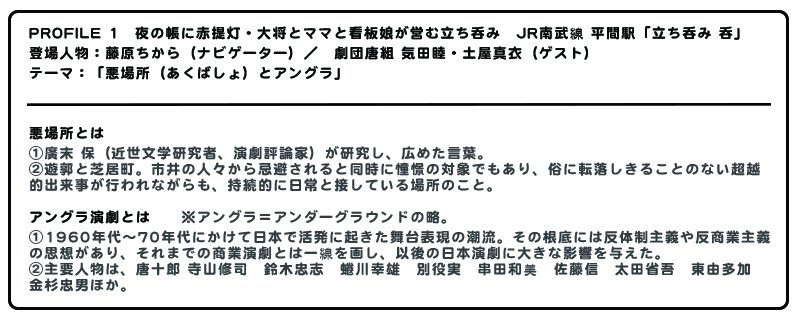
Fujiwara: Sorry, give me some raw!
Tsuchiya: Me too!
Kida: Three draft beers!!
Poster girl: Yes.
Fujiwara: Apparently that girl is the idol of this store.
Poster girl: Sorry to keep you waiting.
Kida: (Ah, so cute♡)
Anyway, cheers!!
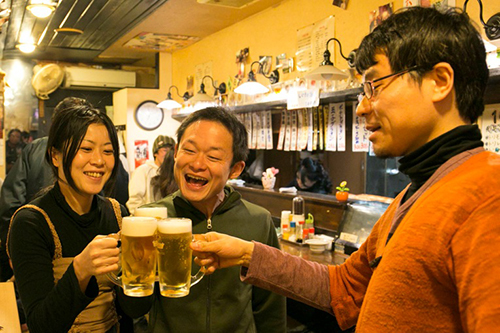
- God of Wine, Kita, Bacchus, Mutsumi -
Fujiwara: In the Edo period, red light districts and theater towns were located in the suburbs, and they were places that were difficult to enter and avoided, but at the same time they were also objects of admiration. They were "bad places," but I think it's interesting that "theatre" was included in them. I'm sure there must have been great energy in them. So this time, I'd like to start with the bold hypothesis that there is something in common between the energy of theater and the energy of drinking establishments.
Tsuchiya: I see. Speaking of drinking establishments, Kida is said to be the "god of alcohol." They say that any establishment that bans Kida will go out of business right away.
Fujiwara: That's scary...Kita Bacchus (laughs)
Tsuchiya: Mr. Kida is the perfect example of a heavy drinker, but what makes him seem like a god is that there are so many other people who take care of him when he's drunk and troublesome.
Kida: I love alcohol♡
Fujiwara: Haha. I'm sure Kara Juro has many heroic tales to tell, like his legendary fight with Terayama Shuji.
Tsuchiya: Mr. Kara is always a fun person, and it's not just because he's drunk.
Kida: Yes, it feels like I'm always acting. Once I was drinking and we were all singing a song and someone told me off. He said, "I'm drinking seriously!" (laughs)
Everyone: lol
Kida: "Even at moments like these, lines, words, and stories come to mind. That's why I have to drink seriously!" (laughs) I don't understand why, but he's always so dramatic like that. But on the other hand, he's also very delicate and sensitive. I think he must be a very refined person.
Fujiwara: This is just my own image, but I'd say he has both delicate and bold sides.
Tsuchiya: Yes, that's true, really. What all 16 members of the troupe have in common is that each of us has a relationship with Kara-san. Kara-san has that relationship with us. Each of us has memories of Kara-san, words of wisdom from him... so we end up staying with him forever.
Kida: I see that person all the way down. That charm is like magic.
Tsuchiya: Yeah, I think everyone is under a spell.
- Encounter with Karagumi -
Kida: When I was 19, I went to see the Karagumi Red Tent for the first time and was so impressed that I decided I wanted to do acting. But I didn't join the company right away and just hung around for a few years. During that time, I still saw Karagumi plays, but it was always raining when I went to see them. So when I saw someone, probably a troupe member, standing in front of the tent, wearing a tattered raincoat and covered in mud, I hesitated to join for about five years (laughs).
Fujiwara: The image of it being gooey and sticky was quite strong (laughs).
Keda: Yes. But even though I had seen a lot of different plays during that time, I hadn't come across a group that could surpass the impact of Karagumi, and that's what prompted me to join. I thought, "I have no choice but to do this."
Fujiwara: I see. What about you, Tsuchiya?
Tsuchiya: I lived in Fukuoka when I was little, and when I was 12 years old, the Red Tent came to Fukuoka. My father took me to see Kara's play for the first time. I was shocked that something amazing had happened in an instant, and I don't really know what it was, but I found myself crying.
Fujiwara: Did you cry because you were moved? Or because you were scared?
Tsuchiya: It was so moving. It was so shiny, I was so shocked that I started crying. When I got home, I asked my dad what it was, but he wouldn't tell me. The next day, I went back to the same place by myself. But the tent that was there the day before was gone. So I just stood there in that vacant lot.
Fujiwara: What was that?! Like that.
Tsuchiya: That impact has remained with me ever since, but I never really got involved in theater. But when I was in college, I heard that Kara Juro was still performing in Shinjuku, so I went to see him. And it was exactly the same as the one I saw back then. If this is what I've always longed for, then what would it be like for me, who had never done theater before, to not get in! With that feeling, I auditioned.
Fujiwara: That's a really great story.
Kida: In the end, I've been here for 10 years, and Tsuchiya's been here for 9 years now. People say, "That's too long!" (laughs)
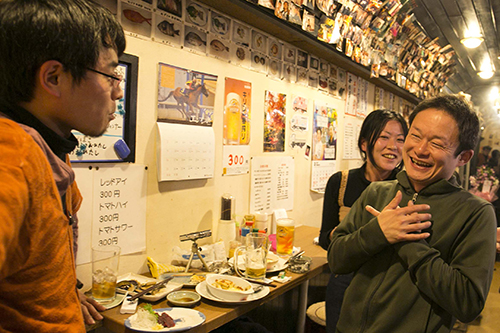
- What is called underground theater?
Fujiwara: I can only guess from documents and legends, but I'm interested in the energy that must have existed when Kara's Situation Theater first appeared in the 1960s, called "underground theater." I think it's connected to the seemingly useless energy that you sometimes feel in bars. Of course, I don't think theater is useless, but I think it's important to have a place where energy swirls a little away from everyday social life and business. I think theater has continued from ancient times to the present because it is connected to the sometimes explosive human energy.
Kida: People often ask me, "Why are you doing theater?" but I've always wondered if I'm doing theater at all. The world that Kara-san writes about happens to be theater. So when people ask me, "Do you like theater?" I can't say, "Yes!" If people ask me, "Are you into underground theater?" I say, "No, I'm not into underground theater, I'm interested in creating the world of Kara Juro."
Tsuchiya: For example, just as surrealism has a different meaning from the word "surreal" as it is used today, I think that "underground" is a different word from what the general public has in mind. In that sense, I don't think there are many people who think within the framework of "underground theater."
Kida: Actually, I guess I'm not on that level.
Fujiwara: That's what I wanted to ask. Originally, "underground" was a term that journalism at the time started using as a derogatory term. In other words, they didn't call themselves that at first, but Mr. Kara and his friends took on the name and created the scene. It's true that now the image has become rigid, and there may be some parts that are belittling.
Tsuchiya: I'd like to get into the details and talk about what exactly surreal is, what exactly underground is, and what it means for people to say that.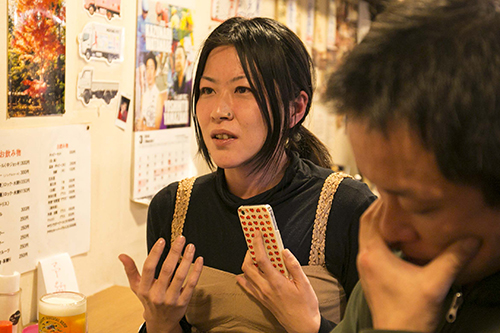
Fujiwara: The reason I chose the theme of "bad places and the underground" this time is because I wanted to reconsider human energy beyond time and generation. For example, you often get lectured by old men at bars, saying things like, "When I was young..."
Tsuchiya: I often get told that too. "What about your generation?"
Kita: Yes, there is. But there's a line in a Korean movie that I think is great, and it's something like, "There are a lot of stupid adults out there. But age isn't a measure of who a person is. So interact with adults, taking that into account."
Tsuchiya: Sorry, I got sidetracked... Kida-san loves movies... (laughs)
Kida: I love movies! I was asked about a movie recently. This is a bit off topic, but...
*Kita will be starring in the film " Mahoro Ekimae Rhapsody " (directed by Omori Tatsushi), which is scheduled to be released this fall!
Fujiwara: No no, let's just say it. Let's just roll with it (laughs).
- What are the commonalities between film and theater and the overwhelming communication they have -
Kida: I've been doing theater for 10 years, but the first question I was asked on the set of the upcoming movie I'm appearing in was, "Are you interested in movies?" I guess people who make movies tend to think that we like theater too.
Fujiwara: By the way, what kind of movies do you watch? Well, let me give you three favorite movies that come to mind right now!
Kita: For me, well... Kusturica's "Black Cat, White Cat"!
Fujiwara: Ah, I love it too, I love the soundtrack too.
Kida: Ten ten ten ten ten
Fujiwara: That's the kind of movie drunkards love.
Kida: When I drink, I drop a little on the ground and say, "Thank you to the ground and the sky." And I drink all the time. And music and that gypsy... (omitted)
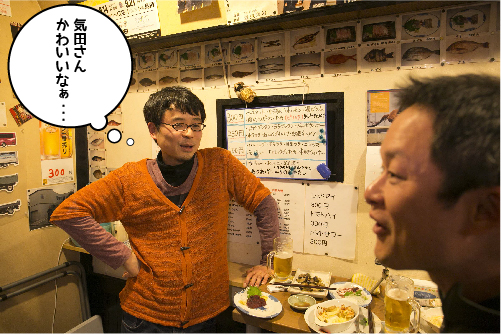
Fujiwara: ...It's a world of alcohol and music (laughs).
Keda: Actually, the process of creating a film or a play is the same. Because you can get into that state, you can be there.
Tsuchiya: When I joined Karagumi, I learned what it means to be in a state of being there even if you don't speak a word.
Keta: It's the same for everyone, whether it's Oriza Hirata or Tsuyoshi Kawamura. It's about whether or not you can communicate overwhelmingly.
Fujiwara: I see.
Kida: Recently, I've started to think that the reason people start acting is probably the same for everyone. For example, the desire to transform into someone other than themselves. I've been doing acting for a long time, and I've wondered whether I can remain myself and talk to someone else. ((Kida-san takes a turn))
Fujiwara: You've now gone around once (laughs).
Kita: Yes, so it's no good if you lose your sense of self.
Fujiwara: So there's Kida-san as an actor?
Kida: Yes. It's about whether Kida can say something to Fujiwara-san. Can he say "hello" so that when he says "hello" he gets a "hello" back? Isn't that the point? It's about being a human being.
Tsuchiya: I think it's difficult because I feel like I will always be left behind.
Fujiwara: Ah, so you step out of yourself for a bit in a theatrical way, but still remain yourself?
Kida: Tsumabuki Satoshi is cool, so it would be best to have him do the role. I can't become Tsumabuki Satoshi! That's what I mean.
Fujiwara: ...Kita-san, those characters are completely different in the first place! (laughs)
- Communication in the bar -
Kida: In the past, I acted because I didn't want people to forget about me, but these days I think it's about communication. I think the audience just automatically thinks, "What is good acting?" I think it's about being able to communicate.
Fujiwara: I think that's it. If you just want to enjoy the story, you can just read a novel. It's related to that, but I think that even if some people who like these bars have bad drinking habits, there aren't any bad people. After all, they like people, they like bars, not drinking at home. I think there's at least a little interest in other people who drink at the same bar.
Tsuchiya: There are times when I want to drink at home, but after three days I start wanting to go out. I want to be with people.
Fujiwara: If you just like alcohol, it would be cheaper to drink at home, but you still go to a bar. I wonder why.
Tsuchiya: I wonder why.
Fujiwara: I don't dislike the feeling of human passion bubbling up that is unique to places like this, different from the world of social niceties.
Tsuchiya: I think it's probably about wondering what this person is thinking other than your own thoughts, and wondering whether this is the same or different.
Kita: Yes, and in my case, I feel overwhelmingly lonely.
Fujiwara: Ah, that's a big problem (laughs). Even just being able to sneak into a bar by yourself can be a relief, right? It's strange, isn't it?
Kita: I also like to drink outside. Well, I don't make that much money, so I prefer somewhere cheap.
Fujiwara: This restaurant is also really cheap, because they have 100 yen menu items.
Kida/ Tsuchiya: That's true.
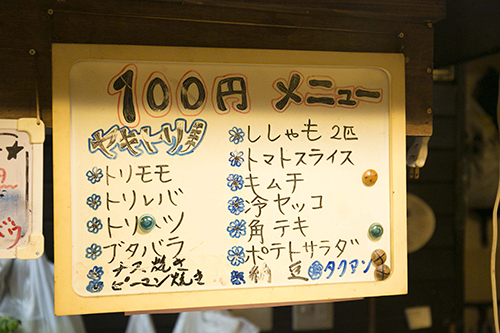
Kita: Ah, give it to me raw!
Tsuchiya: Kita-san, you drank too much!
- Mr. Kara was particular about Kara Juro's world and theatrical troupes (groups) -
Kita: Just to let you know, I've always thought that Kara Juro was the best in Japan, but now I think he might be the best in the world.
Fujiwara: Oh!
Tsuchiya: I definitely think so.
Kita: I guess the magic hasn't worn off yet.
Tsuchiya: It might sound religious, but I can believe in him that much. He's someone who has created such a wonderful world.
Kida: I want more people who haven't seen it to see Kara's world. Some people might think it's too much, but I still want them to see it. Now that you can see it, "You should come and see it!"
Fujiwara: That was emphasized. (laughs)
Kita: Kara's world begins in a small way, like dipping a fishing rod into a puddle and catching a big fish, or chasing ants and coming out into a big ocean.
Tsuchiya: I feel like it's teaching us that there are stories in everyday life.
Kita: What I want people to pay attention to in Kara's acting are the small props.
Tsuchiya: That's because Kita-san is in charge of art, right?
Kida: No, no, a story is born from a small prop. From a tiny stick like this.
Tsuchiya: This time (in the spring performance) it's a Kantenbo. *For details on the performance of the Karagumi Theater Company's "Momotaro's Mother," click here ! (This performance has ended.)
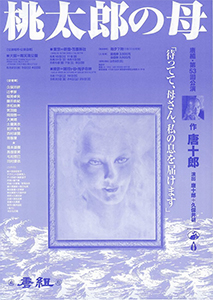
Keta: The story starts small and then spreads out, so it has to be that space (the tent). It can't get any bigger than that.
Tsuchiya: I think we want to remember things that are being forgotten, or things that we should preserve but end up losing. If I'm involved in that, I want to pass it on.
Fujiwara: Yes. I'm thinking of going to a festival in Germany soon, and to be honest, I'm not sure what European theater is really like. Judging only from the works currently being introduced in Japan, contemporary European theater is quite concept-driven, and many of them take up actual political themes. But for example, there is something in Kara's plays that cannot be summarized. Like the emotions of ordinary people. That is not necessarily something that can be understood rationally.
Tsuchiya: Yes. What I find amazing is that even though I've never experienced it, when I read it, images come to mind. Like the burnt-out ruins after the war, a picture of a white dragonfly in the sunset sky, or the stinky smell of a public toilet. Scenes that I don't even know when I experienced them come to mind. I feel like maybe he's the kind of person who is drawing out my experiences down to the genetic or cellular level.
Kida: I think that's where the theater company that Kara-san was so particular about is. I mean, when I think about why he didn't just invite his favorite actors and produce or whatever, I think it's because he values the feeling of being able to see the same thing. The feeling of being able to see the same thing and create it. You can go in with a feeling of "Well, you get it, right?" I thought that there was a theater company of 16 people that could face the audience in that state.
Fujiwara: That's true. When you stopped doing Situation Theatre, you could have steered in a different direction.
Kida: I think there were probably a lot of different options. But Kara didn't choose that option.
- About the affinity between standing bar culture and theater -
Tsuchiya: Fujiwara-san, why do you want to go see a play?
Kita: Oh, I'd like to hear that too.
Fujiwara: I wonder why, I've never been asked that question before. I can't quite put it into words yet, but I think I'm attracted to something that is important to humans. I want to explore that more this year, but for example, maybe I have a desire to discover something Asian that is different from the traditional European theater. You also went to Korea, Myanmar, and other Asian countries at an early stage. Of course, Asia is a diverse place, but I wonder if there are indigenous feelings and emotions that are not rationalism. That being said, I also doubt the premise that the West is rationalism. Anyway, I think that theater before you came along relied too much on imported language from the West.
Tsuchiya: I think Kara's plays should be translated more. I think he is someone who writes about memories that we all have as human beings. So I think we can trust him.
Fujiwara: Yes, that may be true. When I was a teenager, I liked reading Tetsuya Asada's gambling novels, and the postwar Ueno scenery he writes about feels completely similar to Juro Kara's "Shitaya Mannencho Monogatari." There must have been stories of the lives and passions of ordinary people trying to restart their lives from the burnt ruins of the postwar period. But all of that was gradually painted over with something prettier, and disappeared.
Tsuchiya: Yes, everyone believes there are things that shouldn't be lost, so why do they end up disappearing?
Fujiwara: This standing bar culture is about finding that again. So, although it may seem a bit far-fetched, I feel there is an affinity between standing bars and theater.
Tsuchiya: Everyone is lonely, isn't they? Maybe they're looking for something to share that feeling with.
-- Theater is immortal! (Keita-san is intoxicated) --
Kita: I don't think theater will disappear, never will. No matter what Renho or anyone else says.
Fujiwara: That's like, "Do I have to be number one?" (laughs)
Everyone: lol
Kita: It's fine, I don't mind theater being number two. But it won't disappear. It won't be separated out.
Fujiwara: It's true that theater is strong. Film began with the Lumiere brothers and has a history of a little over 100 years, which is also amazing, but theater, while changing its form, has existed since ancient times. It's not limited to technology, as long as you have a body you can do something. That means theater may disappear when humans lose their bodies, but that would be the end of humanity. It's the same as the history of humanity.
Kita: It's immortal, absolutely.
Fujiwara: The closing words were, "Theater is immortal" (laughs)
Tsuchiya: A great quote from Mutsumi, the god of alcohol!
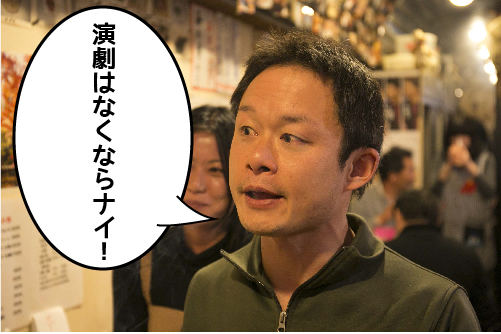
Fujiwara: I'm going to see the Karagumi Spring performance.
Kida & Tsuchiya: Thank you so much!!!
Shop) We look forward to seeing you again. Thank you very much.
Then the three of them returned to Hirama Station together.
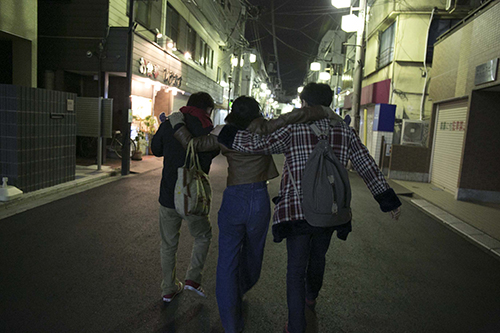
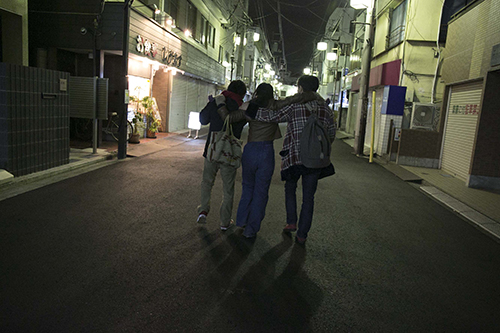
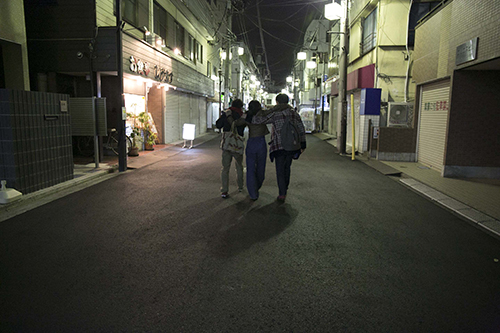
End
- Here's some information about the store! -
This time, I was taken care of by "Standing bar"
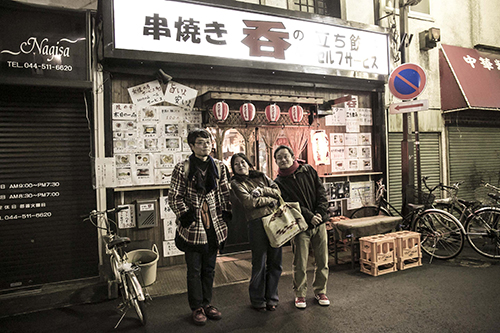
Open all year round
Address: 24 Tajiri-cho, Nakahara-ku, Kawasaki City, Kanagawa Prefecture Phone: 044-544-5441
Access: JR Nambu Line Hirama Station 43m from Hirama Station Business hours: 15:00-22:00
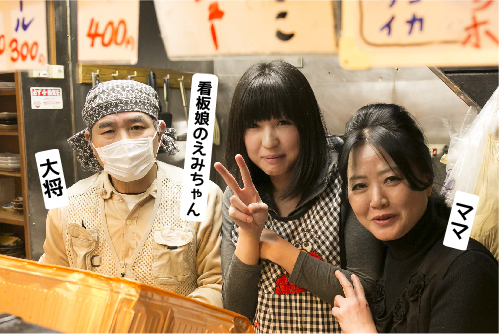
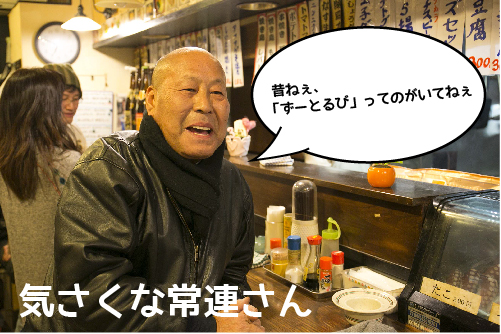
The food we had this time

And here is Fujiwara's recommended menu:
